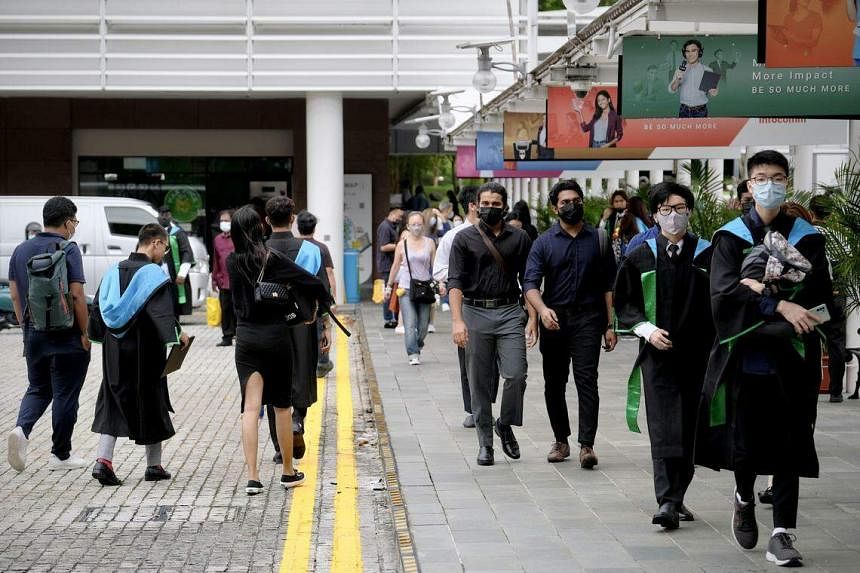SINGAPORE – When JP Morgan launched a one-year apprenticeship for polytechnic graduates in 2015, it was initially met with disbelief from prospective applicants.
“People were not confident they could join an international bank like ours,” said Mr Ong Wei Han, the bank’s senior country business manager for South and South-east Asia, at an industry event held at Ngee Ann Polytechnic (NP) on Monday.
Since then, the apprenticeship has been a resounding success, with departments in areas such as technology, sales and operations keen to take on more apprentices due to their eagerness to learn, he added.
More apprenticeships will be offered in the wider financial sector as part of a three-year grant scheme worth $8 million that the Monetary Authority of Singapore (MAS) launched on Monday to help the sector augment its existing talent pool.
Banks and insurers, among other financial institutions, can tap the Polytechnic Talent for Finance Scheme from Monday to defray the cost of offering internships, apprenticeships and academic sponsorships to polytechnic graduates and students.
The scheme is financed by MAS’ Financial Sector Development Fund and administered by the Institute of Banking and Finance (IBF).
“Many of you are technically competent, good problem-solvers, (and) operate well in a very inter-disciplinary environment, thanks to the polytechnics’ industry-oriented training,” said Mr Alvin Tan, Minister of State for Trade and Industry, addressing polytechnic students in a speech announcing the scheme at the event, titled More Pathways for Young Talent in the Financial Sector.
He also noted that polytechnic graduates were under-represented in the sector, with only 3 per cent of them joining it in full-time permanent roles upon graduation, even though the sector represents 5 per cent of all jobs in the Singapore economy.
Monday’s event was held under the Growing Timber series of events centred on jobs and skills for the financial services sector, which have been jointly organised by MAS and IBF since 2020.
The event comprised a panel discussion in which Mr Ong spoke, sharing sessions with three employers, and an industry showcase by another 11 employers ranging from OCBC Bank to MAS to the Singapore Exchange.
The Polytechnic Talent for Finance Scheme has three tracks.
Under the first track, the scheme will fund 80 per cent of monthly internship stipends for qualifying interns from polytechnics, capped at $1,000 per month, for up to 12 months.
Companies that take on eligible apprentices who join after they complete their polytechnic studies will receive monthly salary support of up to $2,000 for up to 12 months under the second track. It provides additional support for up to 12 months for apprentices who are subsequently placed in roles equivalent to those for university graduates within three years from the start of the apprenticeship.
Under the third track, MAS will cover half the tuition fees – up to $10,000 per student – that finance sector employers pay in their sponsorship of existing employees to take relevant post-diploma or degree-equivalent programmes.

During the panel discussion, Ms Lee Hwee Boon, OCBC’s head of group human resources, said polytechnic graduates who want to join financial services can begin by identifying the type of roles they are keen on based on the skills needed and job tasks that appeal to them.
She added that the services range from developing new technology to working with clients to plan their wealth, or even designing new talent schemes as a human resources practitioner.
Mr Aaron Young, an NP graduate who is the associate director of equity capital markets and execution at hedge fund Dymon Asia Capital, said he chose to enter full-time employment right after finishing his diploma studies, to gain more working experience than peers of his age who went on to pursue a full-time degree.
“I told myself: In exchange for the time that I will free up, I will learn skills that I know no degree holder will have.”
This can be done only in companies that encourage employees to continually add value over time, he noted.
A student who may benefit from the scheme is Khng Kai Le, 18.
Kai Le, who is in the final year of his diploma in business and finance at NP, said he and his peers found it difficult to apply for internships in finance as many employers preferred university undergraduates to polytechnic students.
He added that he clinched an internship with CGS-CIMB Securities earlier this year by connecting with traders there while on a school trip to learn how a financial institution works.
“From my own experience, just being able to shadow and learn from existing industry professionals is a lot more valuable than, perhaps, just the paper certification. So I would actually consider (taking an apprenticeship).”


